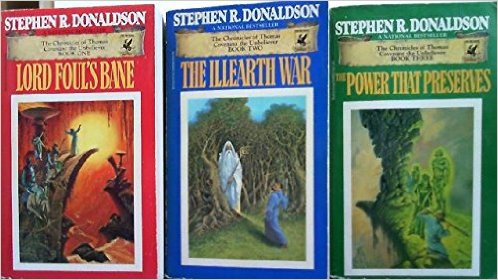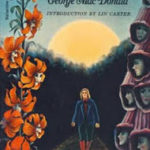Learning From The Secular: Christian Science Fiction And Fantasy’s Distinctive
 What makes Christian science fiction and fantasy distinct from secular science fiction or fantasy? To put it another way, what is it secular science fiction or fantasy tries to accomplish, and what does Christian science fiction or fantasy do differently?
What makes Christian science fiction and fantasy distinct from secular science fiction or fantasy? To put it another way, what is it secular science fiction or fantasy tries to accomplish, and what does Christian science fiction or fantasy do differently?
To answer the question, I turned to the author who had a great influence on me—Stephen Donaldson who wrote The Chronicles Of Thomas Covenant, The Unbeliever. When his first trilogy came out thirty years ago, he addressed why the books were so popular in an article entitled Epic Fantasy in the Modern World. As a preface to his answer, he gave his definition of fantasy:
Put simply, fantasy is a form of fiction in which the internal crises or conflicts or processes of the characters are dramatized as if they were external individuals or events. Crudely stated, this means that in fantasy the characters meet themselves – or parts of themselves, their own needs/problems/exigencies – as actors on the stage of the story, and so the internal struggle to deal with those needs/problems/exigencies is played out as an external struggle in the action of the story.
A somewhat oversimplified way to make the same point is by comparing fantasy to realistic, mainstream fiction. In realistic fiction, the characters are expressions of their world, whereas in fantasy the world is an expressions of the characters.
Would we Christian science fiction and fantasy writers agree with this definition? Or are we, instead, using fantasy to dramatize the spiritual world at large, rather than the spiritual world or the inner life of a particular character?
I wonder if it isn’t stories that dramatize the spiritual world at large that take on a redundant feel.
I love hearing, in real life, the account of another believer coming to Christ. I don’t get tired of it. It causes me to marvel and to rejoice. But at the same time, novels with conversion stories that should also induce a response of celebration, too often feel ho-hum. Redundant.
I have postulated in other places that I think Christian science fiction and fantasy—Christian fiction in general—needs to explore our faith more deeply instead of camping on the beginning when we made the commitment to follow Jesus. So many stories aim simply to tell the story about coming to faith: This is how life in Christ gets started.
Now I’m wondering if there isn’t a second problem: Christian science fiction or fantasy most often dramatizes the spiritual in general terms rather than in the particular. It’s like writing, What is the spiritual journey of Everyman, instead of writing, What is my spiritual journey.

KONICA MINOLTA DIGITAL CAMERA
Preaching is awesome and has a great place in the life of the believer when a pastor opens up the truth of Scripture and shows how it applies to daily life. But a sermon is not a testimony (though it may include a testimony). If someone says, I’m going to tell you my story, and then proceeds to show how you should do this, that, or the other, the problem is not in the material but with the expectations produced in the listeners.
So with fiction.
Another thing about testimonies, they can be about all kinds of things—how God called a person to the mission field, what their experience was like as part of a team working in prisons, God’s conviction about pride, really anything at all, and most certainly not limited to, This is how I became a Christian, though that is one powerful and vital testimony to share.
So what are your thoughts? What is the distinction in your mind between Christian science fiction or fantasy and the books that aren’t specifically Christian?
The heart of this post is a reprint of one published in Spec Faith 1.0 in July 2006









































Interesting thoughts, Rebecca. Speaking for myself, I can’t write anything but Christian fantasy. I am a Christian, and that’s what comes out in allegorical form. I don’t plan this. It just happens. Sometimes, even, I’m surprised to discover an allegorical meaning in my own fiction that had previously eluded me. My purpose for writing is not to teach, although that probably happens. I write to provide a way of escape from the daily grind into worlds of beauty. Mine is a simple lantern, but when I raise it, the flame within illuminates the pathway for others.
Yes. A thousand times, yes. The best pulpit is introspection, not a lecture.
For me, the difference is always summed up in a single word: worldview. That is what should separate Christian SF and fantasy from the secular. Every author has a worldview. This emerges in Donaldson’s anti-hero Covenant, who creates as much havoc as he brings help — or more. It emerges in Martin’s Game of Thrones, where you have a God-less Darwinian dystopia where kindness and goodness are freak accidents. It emerges most strongly in Tolkien’s Akallabeth, where the people of Numenor reject the word of Eru Iluvatar and welcome Sauron, to their everlasting destruction. Worldview determines an author’s story, make no mistake. I agree with you 100% that too many Christian stories focus on conversions, what must I do to be saved. That stems from a worldview that values only conversion, for example. Too many Christian tales are openly didactic thereby, you are absolutely correct. But we must always keep the worldview of the scriptures as our starting point. We must always begin with what God thinks. What WE think is subordinate to that and can come in later. Thank you for bringing this to our attention!
I so appreciate your perspective, Rebecca. Years ago, a friend and I were chatting about our writing journeys. She told me that she had just thrown away any story of hers that did not explicitly mention Christ or tell the story from a Christian worldview. While I fully respected her position, I tried to understand why I balked at the idea of doing the same with my own stories. At last, I came to the conclusion that story should not be sermon. As soon as it becomes a sermon, it loses its power to be a story.
The distinction between speculative fiction books that are or are not specifically Christian is, to me, something we spend too much time trying to define. I find it interesting that you included images of the Chronicles of Thomas Covenant. There is something of truth, of sin, and of redemption in those books, even though I’m not sure Donaldson himself was a believer (though his parents were missionaries).
Or take the Lord of the Rings. Tolkien insisted vehemently that LOTR was not meant to be an allegory of any kind. And yet, it clearly is, and Christians often like to label it “Christian” over the author’s protests.
For me, the big question is not “Is it Christian?” but “Is it true?” Does it have a sense of the reality of life, of the way people really think, of the motivations that drive us, of the sin that besets us, of the caprices of misfortune upon our best efforts, of the desperate need for redemption to originate from outside ourselves? While I think you can go too far trying to discover Christ in Star Wars, some of my father’s first encounters with the truth of God were not through “Christian” stories. We can sense when a story rings true, true to the reality of life here and life in eternity.
Good post, Rebecca! I totally agree with you, too often we write about what we think others need to know, and thus the stories become didactic. And boring, quite frankly. I share your love for Thomas Covenant, and found his quote on fantasy interesting. I’m not sure I agree with him entirely, though, although if that was what he was doing in the Unbeliever Chronicles it worked for me!